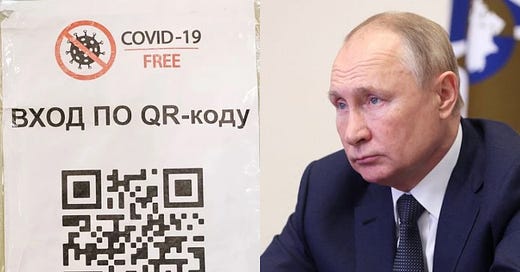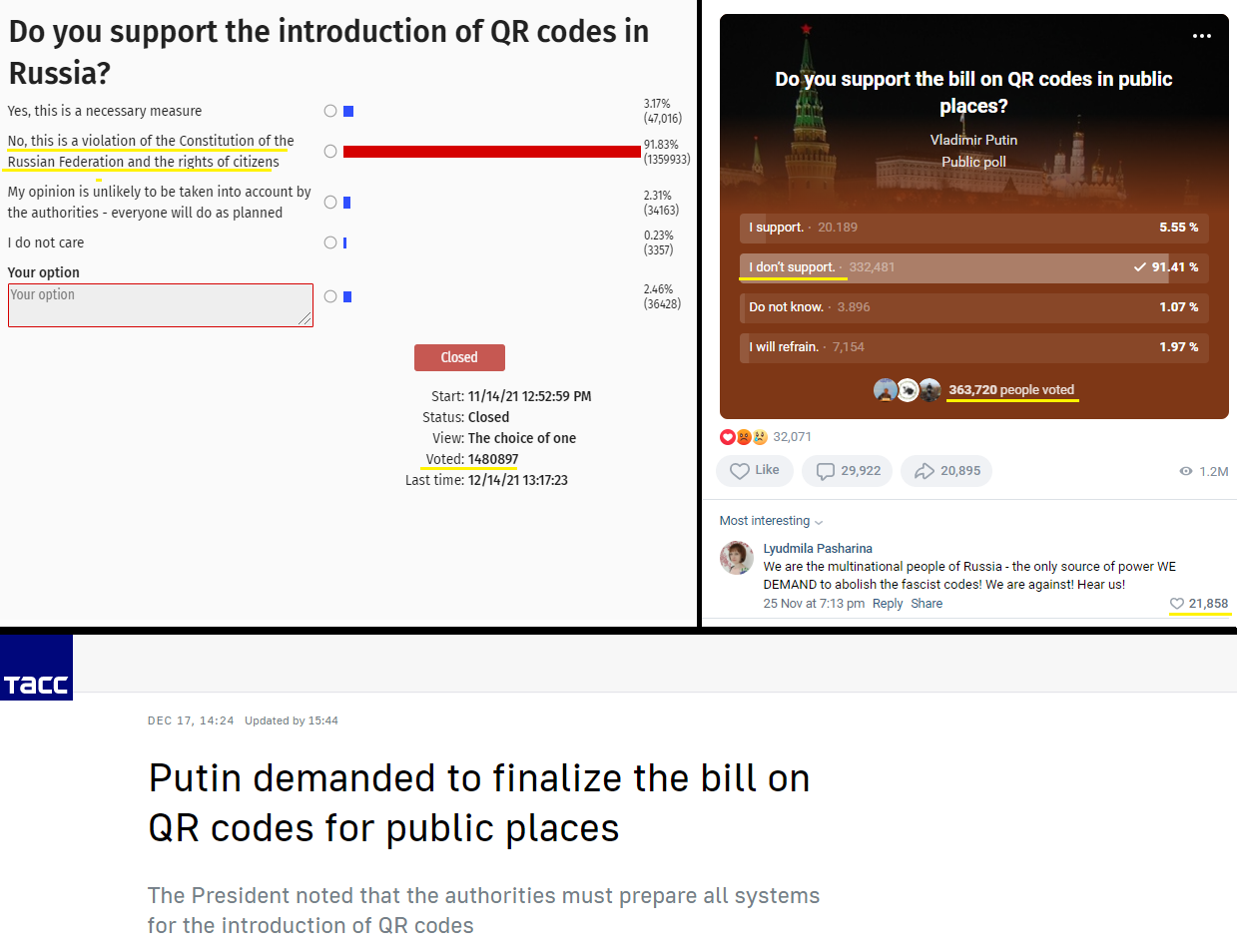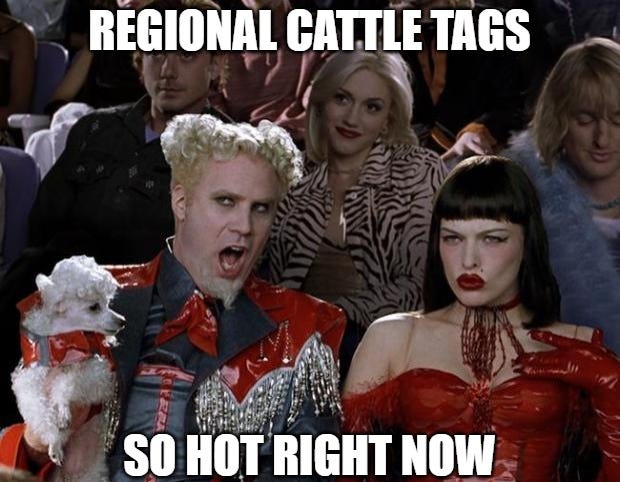Russia shelves national QR code law: What now?
An important and symbolic victory for the Russian people, but...
The State Duma has dropped legislation that would have created a national QR code system—arguably the most unpopular proposed law in recent Russian history.
The unanimous decision was announced by Chairman of the State Duma Vyacheslav Volodin on his Telegram channel.
Notably, even state media acknowledged the bill was dropped after massive push-back from outraged Russians:
The chairman of the lower house also thanked people for the feedback received while discussing the draft law. Earlier, Volodin’s post relating to the bill on the COVID-19 certificates with QR codes gained 1 mln views and over 700,000 comments. The Russian parliamentarian noted that the deputies received more than 120,000 official appeals concerning this initiative.
"It is essential to listen to each other. This will help to avoid mistakes and hammer out the right decisions based on dialogue," the State Duma’s chairman emphasized.
Our friends at Katyusha have described this development as a clear victory and evidence that the federal government was “afraid to be left alone, with the people enraged by its actions”—especially as Washington & Co. continue to raise the stakes with the Kremlin.
National cattle tags were supposed be be rushed through in December. Instead, the legislation was kicked back to the regions for review. Even though United Russia—which led the cattle tag charge—could have pulled the trigger at any time, they realized literally nobody supported this completely deranged and anti-human law.
The final push was supposed to come in mid-January. Instead, more hesitancy. Last week it was announced the vote would be postponed until early February.
And now we learn the bill has been shelved indefinitely.
You can’t take this one away from the Russian people; their vocal and near-unanimous opposition to cattle tags made the Uniparty think twice. And not just think twice—United Russia is clearly afraid to vote on national cattle tags.
Very cool. But Edward Slavsquat—the perpetual party-pooper—feels compelled to ask: does this actually change anything?
The answer, regrettably, is “probably nope.”
Regional cattle tags: so hot right now!
The Kremlin—which supported national cattle-tagging, in case you didn’t know—is just going sit back and relax while the regions do the dirty work. We know this because Kremlin spokesman Dmitry Peskov basically said as much after confirming the national QR code law had been withdrawn:
Peskov said that President Vladimir Putin, Prime Minister Mikhail Mishustin and Deputy Prime Minister, head of the operational headquarters Tatyana Golikova are in daily contact with the subjects of the Federation.
“There is no need for additional actions here, they will be carried out anyway,” he said, recalling that the regions have special powers that no one has canceled.
Dmitry Peskov thinks a national QR code law is superfluous because Russians will still be subjected to ubiquitous cattle-tagging at the regional level—that’s what he’s saying here, correct?
See, this is the problem: the national QR code law was just a formality or perhaps an ill-conceived attempt to speed up the tagging process.
Russians are still getting tagged. Nothing has changed.
For example: the mustachioed Mel Brooks doppelganger currently lording over St. Petersburg is a cattle tag fanatic who has vowed Russia’s second-largest city will never return to normal.
People seem to forget that on November 1, TASS reported all of Russia’s 85 federal subjects had adopted some kind of cattle tag system. Our understanding is that several regions have since rolled back or temporarily suspended the use of QR codes. However, the scope (and enforcement) of cattle tag rules varies from region to region. Some parts of Russia have greatly expanded their use of QR codes since November—St. Petersburg and Tatarstan being the two obvious examples.
The national QR code law would have created a unified, lockstep cattle tag standard. This can still be accomplished—the Kremlin can simply push individual regions to adopt the same rules and enforcement measures. Easy!
The same thing happened with compulsory vaccination, by the way. The Kremlin pretended it was a decision being decided at the regional level. Then, in a span of about two weeks, every region in Russia adopted some form of compulsory vaccination.
It is what it is.









unfortunately in agreement with you, Edward, don’t get too comfortable... the psychological ‘conditioning’ has just begun... roll out, roll back, rinse & repeat... COVID out, hemorrhagic fever in... relentless threat cycle... exhaustion... another ‘miracle’ vaccine complete with new & improved cattle tag to make your life less scary... endgame complete compliance.
Same thing happening in the US: individual states, almost - if not all- blue ones run by Democrat majorities are adopting the Rockefeller-funded SMART Health Card system, a euphemism for cattle tags/apartheid passes. It’s a workaround of national mandates because, as in Russia, it’s far too politically risky and legally untenable. So they’re pawning off the implementation of medical fascism to governors/state legislatures in collaboration with the private sector and NGOs - the much-touted “public-private-partnerships” that makes the Davos set feel tingly all over when taking about. As so many people keep pointing out, it’s the slow-boiling frog strategy, constantly, incrementally, safely encroaching on our rights country by country, state by state, city by city, town by town, etc., until the prison has been built around us and there’s no escape, not even the red (“free”) states, nor Russia.
I agree that these temporary defeats - like the Supreme Court recently overruling the OSHA mandate - are not final victories; we can’t let our guard down or stop fighting until a successful revolution and the global perpetrators are arrested, disempowered, expropriated, and tried for crimes against humanity. That is the only way to sure way to permanently prevent digital slavery.
https://www.nbcnews.com/tech/tech-news/national-covid-vaccine-card-quietly-emerged-rcna11678